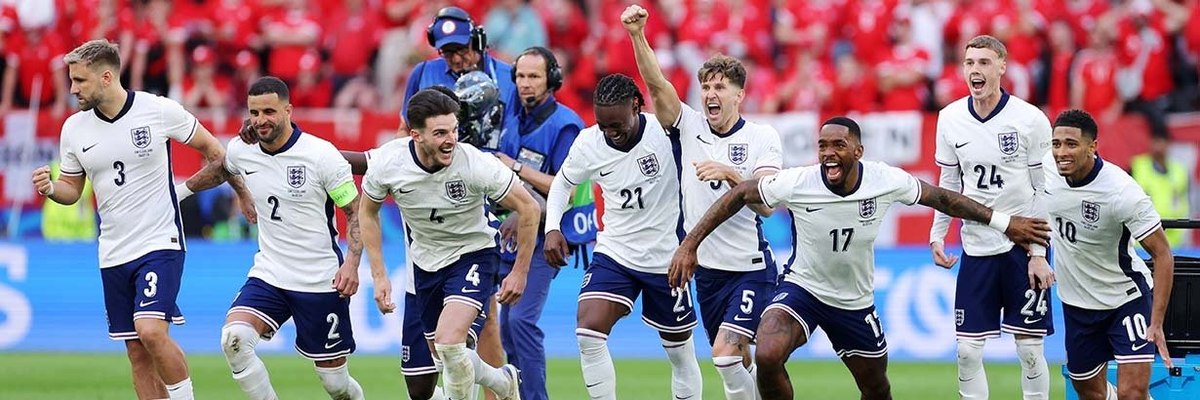Having expected England to get knocked out already, public still lack confidence in their ability to win the Euros
Football’s coming home, or is it? Ollie Watkins’ last-minute winner on Wednesday night has meant that the England men’s team are heading to their first final at a major tournament on foreign soil. Only Spain now stand between them and their first major victory since 1966.
Getting to the final hasn't been easy, nor is it what the public expected. In June, before the tournament started, just one in six (18%) Britons expected England to get to the final, with most predicting they would get knocked out in the quarter or semi finals (33% and 29% respectively). Even at the start of this week, having qualified for the semis, less than a third (29%) expected England to beat the Netherlands, with 43% still doubting their chances. Not even one in ten (9%) felt winning was a possibility.
Now, that has jumped – a wave of optimism pushing a quarter (26%) to believe England will win the Euros. Nonetheless, they are not the public’s favourites – nearly half of Britons expecting a Spanish victory in a repeat of last year’s women’s world cup final. Those very interested in football, though, have greater faith in the Three Lions, with 43% expecting an English victory, against 46% who fancy Spain’s chances more. Scots, however, a bit more sceptical of England’s chances, with just 6% expecting them to beat Spain.
But regardless of what the eventual outcome is, this Euros has managed to engage the British public more than they anticipated. Before the tournament started, only a third (35%) of Britons said they were expecting to really follow it. But this number has steadily risen over the past month, with 45% now saying they have followed the tournament at least a fair amount and 55% saying they will watch the final.
That said, piquing public interest has not fully translated into believing an England triumph will be cause for a national celebration, with only four in ten (39%) supporting a shotgun bank holiday. The country is also not convinced that it is necessary for prime minister Keir Starmer to watch the game – just one in four (25%) believing it is essential for senior politicians to watch a tournament final featuring a home nations team, with this being a decrease from 32% at the start of the Euros.
Following Starmer’s lead, the English football team’s favourability ratings have similarly improved as a result of a successful campaign, albeit having to recover from a massive hit taken after their poorly received early performance. England entered the competition with a net favourability score of +35, with this sinking to just +2 after the round of 16. Now, that figure has shot back up, with a net rating of +39 and nearly six in ten (57%) holding a favourable view of the team as a whole.
Manager Gareth Southgate, who had previously taken a clear hit in popularity, has largely seen a recovery in his ratings, with 53% now having a favourable view of him and just one in five (19%) an unfavourable one. Having fallen to just +7, Southgate’s net score currently stands at +34, a little down on the +41 he held a month ago. No doubt many England fans will be willing to fully memory-hole their earlier doubts around his leadership if he does succeed in bringing football home. However, the public are less sure of whether he deserves to be Sir Gareth Southgate, only a third (33%) believing he should receive a knighthood for getting to the final.
Where positivity has not really returned has been with captain Harry Kane. He went into the tournament with a higher net favourability rating (+38) than the team (+35), but despite his equalising penalty keeping England in the game against the Netherlands, his ratings have not shot back up like the team as a whole. Half of Brits (49%) still have a positive view of him, but the number seeing him in an unfavourable light has risen from one in eight (12%) to one in five (21%).
See the full results here
What do you think about the England football team, sport in general, and everything else? Have your say, join the YouGov panel, and get paid to share your thoughts. Sign up here.
Photo: Getty











